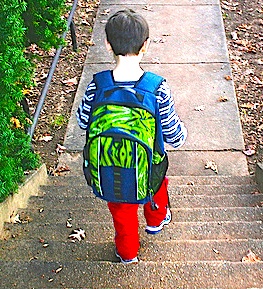It’s the first week in October. We’re ankle-deep into the school year. The new backpacks, so carefully selected in August, already have a fine patina of crud and  some crumpled worksheets or permission slips in more than one compartment. The bright eyed optimism of the back-to-school transition begins to morph to a bleary resignation of another tough day of school ahead.
some crumpled worksheets or permission slips in more than one compartment. The bright eyed optimism of the back-to-school transition begins to morph to a bleary resignation of another tough day of school ahead.
Let’s face it. In October, it gets real — for students and for parents.
Around the time the new Nikes have been broken in, parents tell us that their kids seem to forget all their good intentions for the new school year:
“Mom, this time I’m going to do my homework as soon as I get home!”
“I won’t need any help getting ready in the morning.”
“I’m going to have a great system for keeping track of my papers!”
Poof. Gone like that kettle corn you thought you had hidden away so cleverly. And equally frustrating. You start to see homework delayed and sometimes forgotten. You get the first emails from teachers about missing work. Why do students start out with such enthusiasm, only to sputter and fall back into old patterns of behavior?
Here’s one reason: Because building good habits takes more than good intentions. It’s uncomfortable, messy, difficult work. It takes persistence and patience and encouragement. And time. It takes time. Think Joan Benoit Samuelson (marathoner) instead of Usain Bolt (sprinter).
The other critical component to building good habits is the “how”. Sure, it’s great that a kid has a goal of getting all her homework in on time. We all applaud that. But what exactly will she do in order to accomplish that objective?
If your child answers that question with “I’ll just do it, that’s all,” the red flags should be flapping in the breeze. Without addressing the how, that good intention is doomed - and before long, your child could be struggling in school.
How to help your child follow through on commitments and get back on track in school
1) Help your child to make a specific goal - something that can be objectively measured to assess whether or not it was achieved.
Fuzzy goal: I’ll do much better with remembering my stuff this year.
Specific goal: I’ll remember to bring my clothes for PE every time this semester.
It’s best when the goal is something your child really does care about. In this example, if your child mentioned feeling embarrassed when she did not remember to bring her gym clothes last year, then that’s a motivating goal for her to work toward. If she was all “no biggie” about it, then go back to the drawing board with her to find a worthy target.
Oh, yeah, and easy does it on the goal setting. One to three carefully selected ones is typically the most anyone (child or adult, for that matter) can manage at a time.
2) Prompt your child to make a plan for how to achieve that goal.
If we continue with the example above, the plan might be: I'll put reminders on my phone calendar that will pop up the night before when I'm packing my backpack so I remember to put my gym clothes in there. Then, I'll put a second reminder for the next morning to double check before I leave the house.
3) Help her to be accountable for progress toward her goal.
It is often a good tactic to draw on something other than parental oversight for this, lest it be construed as nagging (thereby putting that goal in jeopardy). Here’s where a favorite teacher, guidance counselor, aunt, or coach can collaborate and set consistent check-ins with your child to see how she’s doing. As executive function coaches, we see the difference consistency makes in helping students achieve their goals. Students know their good intentions won’t slip through the cracks and be forgotten like last year’s locker combination when they have regular follow-ups. We like to use these meetings to problem solve when it’s been tough to follow through on those carefully laid plans or to anticipate upcoming challenges (“Oh, I have a late play rehearsal this week, so I won’t even see my reminder!”).
4) Celebrate when she achieves her goal and reflect on why she hit her target.
This builds a student’s metacognitive skills - the ability to gain insight into her own behavior and thinking - which sets the stage for better overall self-management. In other words, reflection builds better executive function skills.
When the shine is off the back-to-school apple, and the days get shorter, students can lose their oomph and settle back into the bad habits that beleaguered them the year before. The message we share with our students that we coach is that new habits take time and persistence to establish.
The payoff is sweet as a pumpkin spice Oreo when students know how to set and achieve goals and get back on track in school.
Is your child forgetful? Download our guide below for 4 of our coach's tips to help students remember what's important to them.
photo credit: woodleywonderworks descent via photopin (license)

